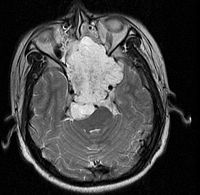
Photo from wikipedia
Simple Summary Chordomas are rare malignant bone tumors that predominantly occur along the spine. The most frequent alterations include the loss of PTEN and p16 proteins. While both oncoproteins have… Click to show full abstract
Simple Summary Chordomas are rare malignant bone tumors that predominantly occur along the spine. The most frequent alterations include the loss of PTEN and p16 proteins. While both oncoproteins have been investigated as independent prognostic factors, in our chordoma cohort of 43 patients we were able to define a subgroup of 16% harboring the concomitant loss of PTEN and p16. We could show that these patients had a shorter overall survival. We exploited the oncogenic driver addiction in these chordomas by simultaneously inhibiting the PI3k/AKT/mTOR and CDK4/6 pathways. We observed synergistic effects for the drug combination of rapamycin and palbociclib, providing a promising novel strategy, especially for PTEN−/p16− chordoma patients. Abstract Chordomas are rare bone tumors arising along the spine. Due to high resistance towards chemotherapy, surgical resection—often followed by radiation therapy—is currently the gold standard of treatment. So far, targeted systemic therapies have not been approved. The most frequent molecular alterations include the loss of PTEN and CDKN2A (encoding p16), being associated with poor prognoses in chordoma patients. Specific inhibitors of the PI3K/AKT/mTOR pathway as well as CDK4/6 have shown antitumor activity in preclinical studies and have recently been under investigation in phase II clinical trials; however, the clinical impacts and therapeutic consequences of concomitant PTEN and p16 deficiency have not yet been investigated in chordomas. In a cohort of 43 chordoma patients, 16% of the cases were immunohistochemically negative for both markers. The simultaneous loss of PTEN and p16 was associated with a higher KI-67 index, a tendency to metastasize, and significantly shorter overall survival. Additionally, 30% of chordoma cell lines (n = 19) were PTEN-/p16-negative. Treating these chordoma cells with palbociclib (CDK4/6 inhibitor), rapamycin (mTOR inhibitor) or the pan-PI3K inhibitor buparlisib significantly reduced cell viability. Synergistic effects were observed when combining palbociclib with rapamycin. In conclusion, we show that patients with PTEN-/p16-negative chordomas have poor prognoses and provide strong preclinical evidence that these patients might benefit from a Palbociclib/rapamycin combination treatment.
Journal Title: Cancers
Year Published: 2023
Link to full text (if available)
Share on Social Media: Sign Up to like & get
recommendations!